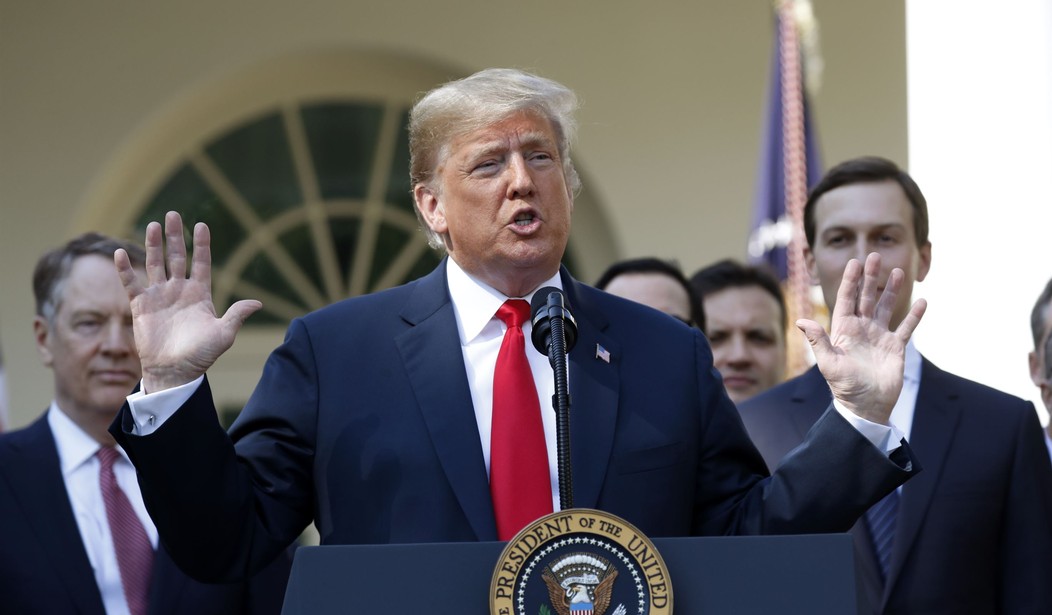The United States should be doing all it can to maintain a strong economy while protecting Americans’ wallets and jobs. One significant way to help inoculate the economy from a slowdown – and to make it hum along even faster – is more free trade.
Trade issues aren’t just the concern of policy wonks – they’re critical to the American way of life. Free markets, economic freedom, and free trade have enabled hundreds of millions of people around the world to escape poverty. And they’ve enabled countless others – especially here in the U.S. – to enjoy levels of prosperity never before seen in human history.
Americans have seen lower prices on goods and services – like groceries, cars, and tools – and more choices at stores as tariffs are removed. They’ve also seen higher wages and more job opportunities as more trade grows the economy. In a place like Washington state, for example, international trade and investment directly support nearly 600,000 jobs—roughly one-fifth of private-sector employment.
As President Ronald Reagan said, “The winds and waters of commerce carry opportunities that help nations grow and bring citizens of the world closer together. Put simply, increased trade spells more jobs, higher earnings, better products, less inflation, and cooperation over confrontation. The freer the flow of world trade, the stronger the tides for economic progress and peace among nations.”
The Heritage Foundation’s annual Index of Economic Freedom studies the effects of economic freedom around the world. The research shows that year after year, increases in free trade strongly correlate with increased prosperity, health, education, and even an improved environment.
Recommended
Currently, President Donald Trump is asking Congress to pass the United States-Mexico-Canada Agreement (USMCA), a trade pact that would replace the old North American Free Trade Agreement (NAFTA). Vice President Mike Pence recently visited The Heritage Foundation to talk about the importance of the USMCA.
Mr. Pence said the USMCA would grow the American economy when other economies around the world are slowing. He highlighted the International Trade Commission’s report, which estimates that once the USMCA is in full effect, U.S. GDP would increase by $70 billion.
He discussed how the USMCA would benefit many areas of the economy, including manufacturing and agriculture, and specifically the energy sector: “Canada and Mexico are the top two American destinations for oil, already receiving nearly 30% of our exports. That number will only increase under the USMCA. It will keep Mexico’s energy resources open to development by American companies and it will guarantee no tariffs on American oil.”
Twenty-five years of more open trade between the United States, Mexico, and Canada has allowed North America to become one of the most competitive regions in the world for manufactured goods. America is exporting more goods around the world, benefitting millions of American workers and their families. Families and businesses in the U.S. have also benefitted from increased access to imports from Canada and Mexico, ensuring better prices and more options at stores.
The USMCA continues NAFTA’s tariff-free treatment of many goods and services but also opens up new markets – for example, allowing American wheat farmers to sell in Canada and allowing American dairy producers to sell a larger share there. It also strengthens protections for intellectual property rights, which promote more innovation and the creation of new products; and it improves technology in the customs process to reduce wait times for products to cross borders.
While the agreement is a positive step forward from NAFTA, there are still issues that must be addressed, including minimum wage requirements and provisions primarily focused on pushing unrelated environmental policy that has little to do with allowing free trade. These policies create barriers to trade rather than free it up, making goods and services more expensive or stifling trade altogether.
The Trump administration is working on legislation that Congress would need to pass to implement the agreement. The bill, along with addendum agreements with Canada and Mexico, provide an opportunity to address these issues.
Trade deals shouldn’t set labor policy or environmental policy. Trade is about increasing the freedom of people to buy and sell without government intervention. As the USMCA is being considered, eliminating trade barriers, not erecting new ones, should be the objective.
While some tweaks could improve the agreement, the USMCA as negotiated still represents a tremendous opportunity for economic growth for America. Free and open trade puts American families, businesses, workers, and farmers first by reducing prices, increasing exports to our neighbors and the world, and creating more and higher paying jobs as a result of increased economic activity.
























Join the conversation as a VIP Member